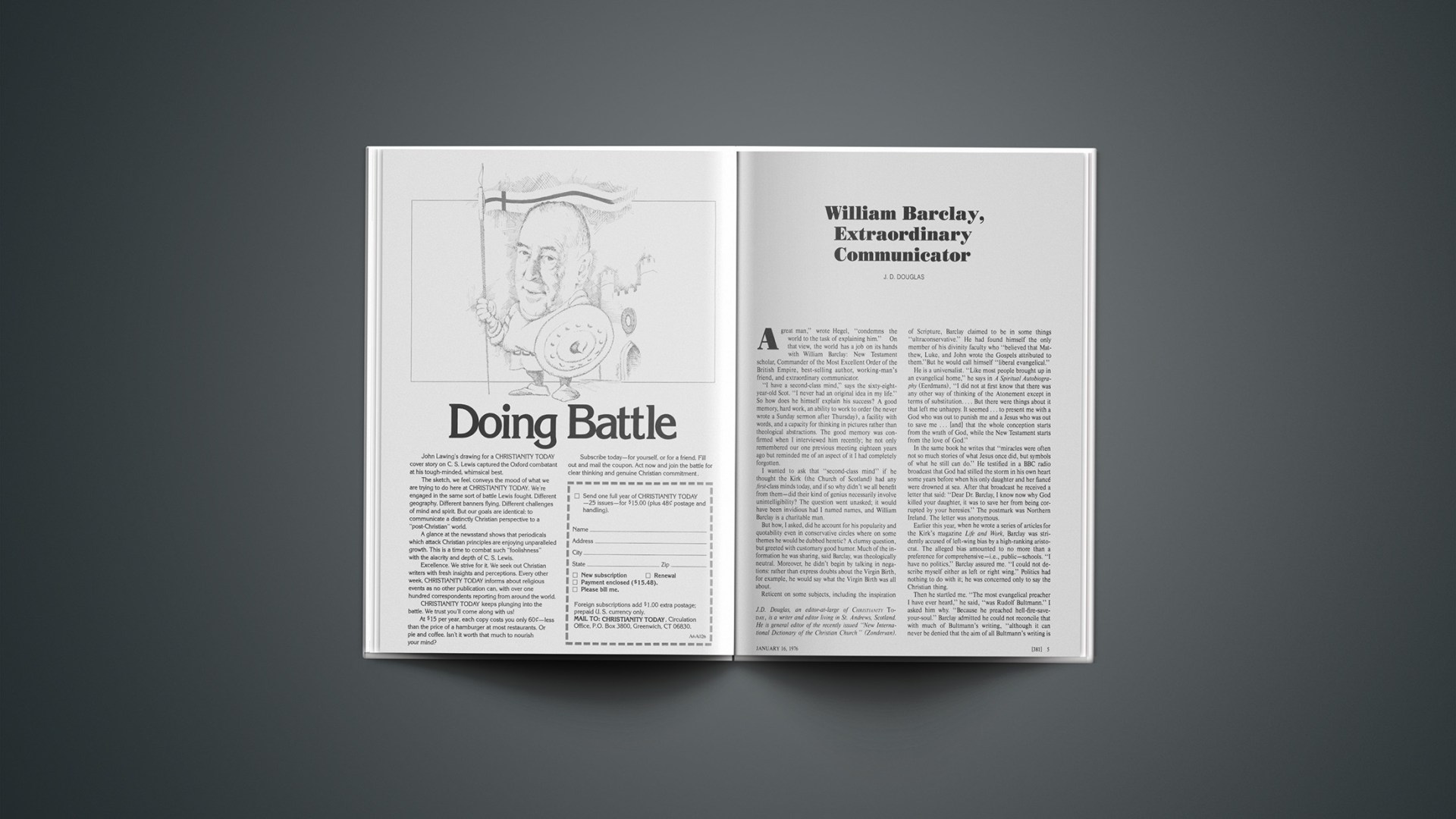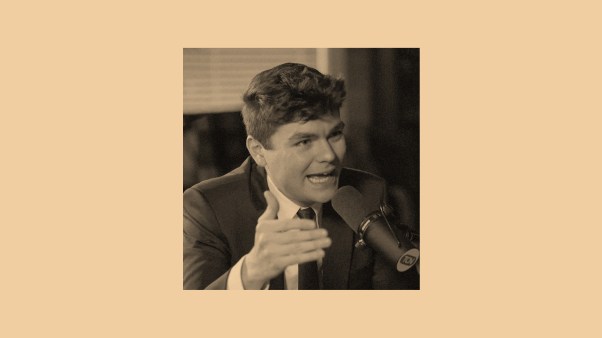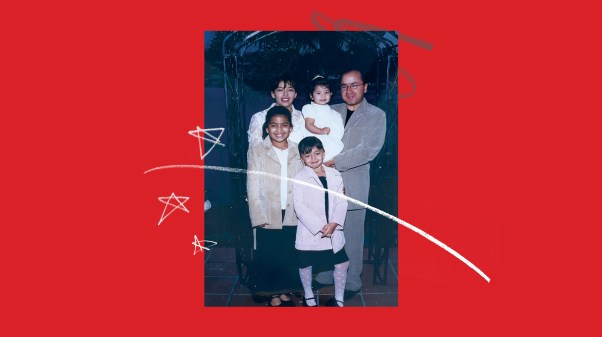A great man,” wrote Hegel, “condemns the world to the task of explaining him.” On that view, the world has a job on its hands with William Barclay: New Testament scholar, Commander of the Most Excellent Order of the British Empire, best-selling author, working-man’s friend, and extraordinary communicator.
“I have a second-class mind,” says the sixty-eight-year-old Scot. “I never had an original idea in my life.” So how does he himself explain his success? A good memory, hard work, an ability to work to order (he never wrote a Sunday sermon after Thursday), a facility with words, and a capacity for thinking in pictures rather than theological abstractions. The good memory was confirmed when I interviewed him recently; he not only remembered our one previous meeting eighteen years ago but reminded me of an aspect of it I had completely forgotten.
I wanted to ask that “second-class mind” if he thought the Kirk (the Church of Scotland) had any first-class minds today, and if so why didn’t we all benefit from them—did their kind of genius necessarily involve unintelligibility? The question went unasked; it would have been invidious had I named names, and William Barclay is a charitable man.
But how, I asked, did he account for his popularity and quotability even in conservative circles where on some themes he would be dubbed heretic? A clumsy question, but greeted with customary good humor. Much of the information he was sharing, said Barclay, was theologically neutral. Moreover, he didn’t begin by talking in negations: rather than express doubts about the Virgin Birth, for example, he would say what the Virgin Birth was all about.
Reticent on some subjects, including the inspiration of Scripture, Barclay claimed to be in some things “ultraconservative.” He had found himself the only member of his divinity faculty who “believed that Matthew, Luke, and John wrote the Gospels attributed to them.”But he would call himself “liberal evangelical.”
He is a universalist. “Like most people brought up in an evangelical home,” he says in A Spiritual Autobiography (Eerdmans), “I did not at first know that there was any other way of thinking of the Atonement except in terms of substitution.… But there were things about it that left me unhappy. It seemed … to present me with a God who was out to punish me and a Jesus who was out to save me … [and] that the whole conception starts from the wrath of God, while the New Testament starts from the love of God.”
In the same book he writes that “miracles were often not so much stories of what Jesus once did, but symbols of what he still can do.” He testified in a BBC radio broadcast that God had stilled the storm in his own heart some years before when his only daughter and her fiancé were drowned at sea. After that broadcast he received a letter that said: “Dear Dr. Barclay, I know now why God killed your daughter, it was to save her from being corrupted by your heresies.” The postmark was Northern Ireland. The letter was anonymous.
Earlier this year, when he wrote a series of articles for the Kirk’s magazine Life and Work, Barclay was stridently accused of left-wing bias by a high-ranking aristocrat. The alleged bias amounted to no more than a preference for comprehensive—i.e., public—schools. “I have no politics,” Barclay assured me. “I could not describe myself either as left or right wing.” Politics had nothing to do with it; he was concerned only to say the Christian thing.
Then he startled me. “The most evangelical preacher I have ever heard,” he said, “was Rudolf Bultmann.” I asked him why. “Because he preached hell-fire-save-your-soul.” Barclay admitted he could not reconcile that with much of Bultmann’s writing, “although it can never be denied that the aim of all Bultmann’s writing is confrontation, the confrontation of the individual with the living Christ.”
When I took him to task for his equation of home and happiness with marriage and family (a bachelor interrogator could do no less), I challenged his apparent dogmatism on the issue. But the man whose own marriage has been very happy (though he doubted if his wife had read any of his books) was unrepentant. He disapproved of a celibate ministry; parish work was likely to be carried on more effectively by a married man who needed the help of a partner in his work. Resisting the temptation to ask if this was not connected with an earlier admission that he was “a handless creature,” domestically helpless, I pressed him on the broader issue, but he was reluctant to make exceptions, other than for missionaries. Oddly enough, he turns things on their head regarding women ministers: he disapproves of their being married. Working wives on the whole he thought were bad for home and children.
In a magazine article Barclay had cited the danger of misrepresentation in journalism. I asked if he had been a victim of this, but he had no substantial complaint; his concern rather was about those who condemned him without having read a word he had written. It was not unusual for conservative students to come to him apologetically after their first year in his class, admit that they had been warned against him, and say how unfounded had been their fears. Barclay genuinely does not mind criticism—if critics get their facts right. A naturally friendly man, he finds nothing more offensive than a shut mind, but he would still knock “the mind which is open at both ends.”
He does not think anyone has a right to confront a total stranger with “Are you saved?” It was like asking about the state of the stranger’s bank account. “A relationship has to be arrived at in which it is possible to talk of these things. But the great and grave danger is to lose the chance of talking about them at all.”
Like Baron von Hügel, William Barclay urges ministers to have some non-religious interests, including TV-watching to keep them abreast of current talking points. His own hobbies are stamp-collecting, following the soccer scene, and golf, which he gave up reluctantly in recent years because of emphysema (he had “come to look on heaven as a place where there will be no more stairs”). Although deaf for more than forty years, he had a hearing aid that not only overcame the deficiency but enabled him to conduct choirs. I recall that my college entertained Barclay’s once. His triumphed on the soccer field, then under Barclay’s baton sang to soothe the wounded feelings of the vanquished. Music has been an integral part of William Barclay’s life. As a parish minister in Renfrew he always listened to the Scottish Orchestra on Saturday evenings, convinced that “great music is a tension-reliever,” and by far the best preparation for Sunday activity.
I asked if he had any suggestions about how to arrest the alarming decline in church membership (the Kirk has lost 120,000 communicants or 10 per cent of the total in the past five years). The professor said he found an openness to religion, but he saw a problem in how to make Christianity meaningful to those outside the church. The traditional conservative evangelical approach he described as being “too authoritative in the beginning.” The church had to be taken to the people; he would be glad to conduct a service in the golf-club bar on a Saturday evening—but how the Gospel was got across depended on the place and the circumstances.
In church services, Barclay would like to see on Sunday evening a radical reordering of the traditional format that presented visitors with hymns they might not know and prayers that meant little. How would he do it? “Begin with the sermon,” he replied promptly, “talk for forty-five minutes on a topical theme like ‘Christianity and Money’ or ‘Christianity and Sex.’ ” That strategy was followed in the suburban Glasgow church of which he is an elder. After the sermon/lecture there was an interval for tea in the church hall, then discussion when those with a point of view—trade unionist, communist, or anyone else—could have his say. The proceedings concluded with an epilogue. Barclay said that such occasions might bring 400 to church, of whom perhaps 150 would stay for discussion—this, it should be added, in a land where many churches have canceled their evening services for lack of support.
There seemed some link here with Barclay’s advocacy of a two-tier membership, put forward in one of his books where he deplores the virtual disappearance of church discipline. In one category he would place those who are “deeply attracted to Jesus Christ and the Christian way,” in another “the many fewer who are prepared to make a total commitment to Jesus Christ.”
Although he retired from Glasgow University in 1974, Dr. Barclay is now a visiting professor in the biology department in the University of Strathclyde. The title is an administrative expedient; his task is to lecture on professional ethics. This is not too demanding, however, and most weekdays he is found in his office at the Collins publishing house, not far from Glasgow’s ancient cathedral. There he works on the Old Testament part of his Daily Study Bible. The New Testament series (published in the United States by Westminster) has in two decades sold about 1.5 million copies and has been translated into many languages, including less well-known ones such as Estonian and Burmese.
Barclay plans to produce three volumes every two years, and to complete the Old Testament in six years. The first installment is due at the end of March. Lady Collins, a devout Roman Catholic and head of the company sponsoring the present project, made only one proviso: that he begin with the Book of Psalms.
Explain the phenomenon as we will, William Barclay’s writings and broadcasts have spoken about Christianity to many millions otherwise unreached. Those who criticize his message could well copy his method, lest he reasonably point out that he prefers his way of doing it to their way of not doing it. Only with culpable slowness are some of us learning that it is not enough to know the Lord’s song in a strange land; we must also learn how best to sing it.










